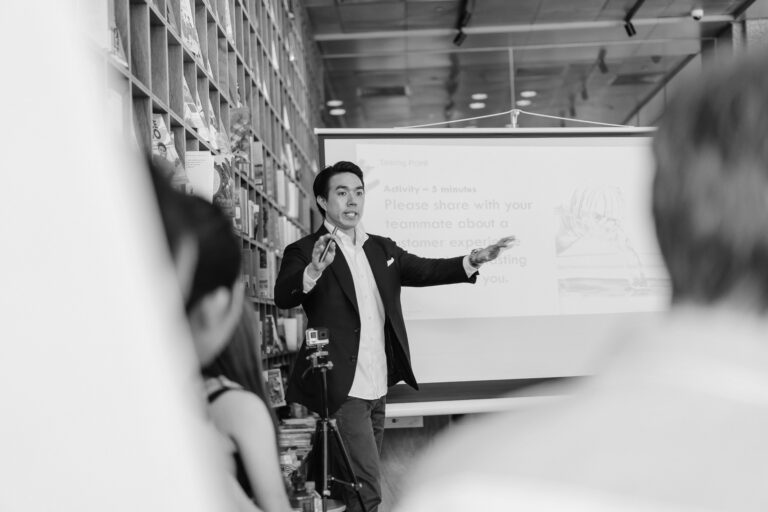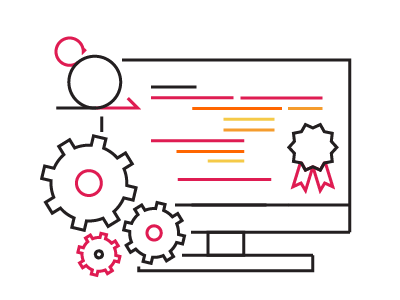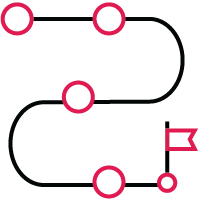The demand for tech talent is at an all-time high and is only expected to…
Case Study
Global Casualty Insurance Leader Wins Big with Innovative New Upskilling Program for Agile Developers
Company Details
Industry: Insurance
Company Size: 30,000 full-time employees plus 13,500 independent brokers and agents
Location: New York, United States
Products: Personal and Commercial Casualty Insurance
Cprime Services:
Executive Summary
One of the biggest drivers of constant change is technology. As a result, there's always a need for more and different technologists. This global leader in casualty insurance was no exception when they put out an RFP looking for solutions. They were struggling to find enough developers while facing downsizing in other areas. The innovative solution proposed by Cprime won their attention and support.

Overview
The company is a leading underwriter of commercial property-casualty insurance in the US. It also operates a large national personal insurance business through independent agents across the US. A Fortune 100 organization, they have an extensive international portfolio as well.
Through its network of nearly 50,000 employees, the company has established a solid reputation in the industry. Making the best of available technologies is how they remain responsive to their clients’ needs.
An innovative solution for reskilling existing employees
The MakeDev Program is an offering wholly unique to Cprime and addresses the ongoing tech labor shortage. It allows companies to build new tech talent from their current valued, experienced workforce. These are positions that may otherwise be downsized or reallocated in the future. The same framework can also be applied to quickly upskilling new hires who have never worked in software development before.
Not a standard bootcamp training program
Cprime has long been a leader in the technical agile space. They have over thirty years of experience in training and professional development. Importantly, trainers and coaches are not just experienced teachers. They are practitioners who are in the trenches using the skills they’re passing on.
Ken Robinson, a Cprime technical agile coach who participated in the program, explains, “this is not a standard bootcamp. We’re not just dropping a bunch of knowledge on these students and sending them on their way. Rather, it’s a strategic combination of training, coaching, and real-world apprenticeship that leads to real, applicable skills.”
Nate Ashford, Cprime strategic technical coach, was the lead on this program. He added, “We employ a model that ensures that the short time we have is the most impactful. Rather than spending time on lectures and notetaking, students come into class with the curriculum already in their minds. They use in-class time to discuss, work out problems, and establish good habits. This helps them synthesize what they’re learning with what they’ve already learned.”
Bespoke instruction based on each student’s needs

David Passarelli, who is a Cprime technical coach, partnered with Ken Robinson to implement the MakeDev program at this company. He noted, “I think one of the keys to the success of the MakeDev program is that Ken and I had the opportunity to get to know these students so well. We were encouraged to go beyond just being teachers and became mentors, confidants, even cheerleaders, as needed. We could truly tailor the instruction to each student’s unique needs, strengths, and learning styles.”
Addressing the company’s staffing issues
This unique reskilling program offers companies the opportunity to address more than one challenge at the same time:
- The necessary reallocation of resources from non-tech roles to IT – as many functions become increasingly automated and software-centric, the need for people to fill these roles lessens as the need for software engineers to build the replacement systems rises.
- The tech talent shortage – as already mentioned, there is an ever-growing demand for software engineers and developers that far outstrips the volume of skilled applicants coming out of universities and college programs.
- The need for more diversity and inclusion in tech – at the same time, the overwhelming majority of software engineers coming through traditional programs are white males, leaving a considerable proportion of the company’s internal and external customers who are not represented within the development teams.
“In this case, I worked closely with the HR team at this company to address each of these challenges head-on,” says Ashford. “When we were looking into how to roll this out to the broader organization and choose participants, we developed our criteria with these issues in mind. Eventually, we settled on a simple essay contest to judge interest in participating and jumpstart the application process. The announcement went out to the entire organization, asking interested applicants to write a brief essay. We asked them to explain why they wanted to participate and what it would mean to their lives.”
They received over five hundred applications for the twenty available slots.
Participants were selected strategically for optimal impact
“We found that many who applied for the program fit closely with the established criteria,” Ashford recalls. “We weren’t looking as much at previous work experience or education, but rather at demonstrated skills such as logical reasoning, problem-solving ability, perseverance, and the grit required to take on a rigorous learning challenge.”
Robinson explains, “We knew the curriculum and our coaching ability were sufficient to provide the basic skills these folks needed to succeed in this program. But, if they didn’t really want it — if this wasn’t something they were willing to commit to for reasons beyond curiosity or just a paycheck — we knew it wouldn’t be enough.”
They were also excited to find it was a highly diverse group of applicants. “Eighteen of the final class of twenty students did not fit the standard profile for software engineers across industries. It was so exciting to see,” Passarelli shares.
Most of those selected to participate came from the claims processing and customer service departments — areas of the business facing potential downsizing for the reasons cited above. “Now,” Ashford states, “these experienced claims processors and CSRs are working on the building and enhancing of the very internal systems they previously used to serve customers. Traditional recruiting methods could have never found that kind of in-depth domain knowledge and experience.”
A student-centric approach based on empathy
“What I love most about the MakeDev model,” Pascarelli notes, “is the personalized attention and guidance we, as instructors, can provide.”
Both Ken and David hail from long careers working on development teams in a corporate setting, much like the students they now train. This provides a level of empathy and practical experience that far exceeds what a purely academic teaching model would offer.
Robinson concurs, “As the students progressed through each unit, they inevitably ran into more challenging areas that required a little more support or explanation. The program makes that easy by design. David and I didn’t have to slow the entire group to help one person or force anyone to keep up when they couldn’t do so. And, our experience working in corporate IT teams made it easy for us to relate our coaching to the kind of problem-solving situations they would need to face in the future.”
Amazing results

Leaders within the organization have noted that having these graduates on their teams has had a positive impact in several ways:
- The organization was undergoing an Agile transformation at the time, so injecting team members into the teams who knew no other way to work served as a forcing function to help push these teams to function with more agility overall.
- The experience they bring from their previous roles — nearly all of which were more customer-facing than the rest of the IT team members — has proven invaluable as they work to improve the functionality of internal claims processing systems.
- The excitement the program generated across the organization was palpable and continues to be a subject of conversation.
Many departments and leaders, including the CEO himself, joined in to support and encourage the students as they progressed. Robinson recalls, “When the students finished the classroom portion of the program after four months, we held a graduation ceremony. The number of people from around the organization who wanted to attend and join in the celebration was surprising.”
Ashford adds, “I even overheard the CEO say this was the easiest funding approval he’d ever signed. He said the value to the organization was just undeniable.”
Plans to repeat the process
The company is now planning to repeat the process, perhaps on an ongoing basis.
“That makes sense,” Passarelli concludes. “The drivers that make the MakeDev program such a powerful solution aren’t going away anytime soon. As this company learned, the pace of change and ongoing need for software engineers makes it an unbeatable value proposition in today’s market.”
Interested in similar results for your organization? Explore our MakeDev experiential training solution.
About Cprime
Cprime is an industry-leading, full-service global consulting firm with a focus on providing integrated and innovative solutions around digital transformation, product, cloud, and technology. With over 20 years’ experience, we provide strategic and technical expertise to businesses across more than 50 industries. Our team of advisors and technical experts have the know-how to meet organizations where they are to develop actionable solutions and solve business challenges. We also collaborate with our expansive network of partners to design, deploy, and harmonize technology stacks across organizations. Our mission is to empower visionary business leaders and teams to reimagine the future of work to achieve better outcomes.
Want to share with a colleague? Download the PDFFeatured Team Members

Nate Ashford
Strategic Technical Coach
Nate is an experienced architect, agilist, and business leader focused on helping organizations navigate technology transformations to innovate and adapt to the accelerating rate of change in the market. Over 20 years as an Agile Coach and Practitioner, Nate has developed a simple, pragmatic approach that draws from multiple frameworks and methodologies, and emphasizes empathy, personal growth, and process automation.

David Passarelli
Technical Coach
David is an experienced software developer who is passionate about helping others to learn about Agile principles and practices. With an extensive background in multiple technology stacks, a keen awareness of security and privacy best practices, and a deep understanding of Lean and Agile methodologies, David understands how to design, develop, deploy, and maintain software in a secure, sustainable way.

Ken Robinson
Technical Coach
Ken is an energetic leader who uses passion and imagination to empower individuals and organizations to fulfill on their mission. He has a background in software engineering, project management, training, and coaching. Ken utilizes an interactive model of transformational education that engages and empowers teams to identify and take steps to transform their teams and their organizations.

